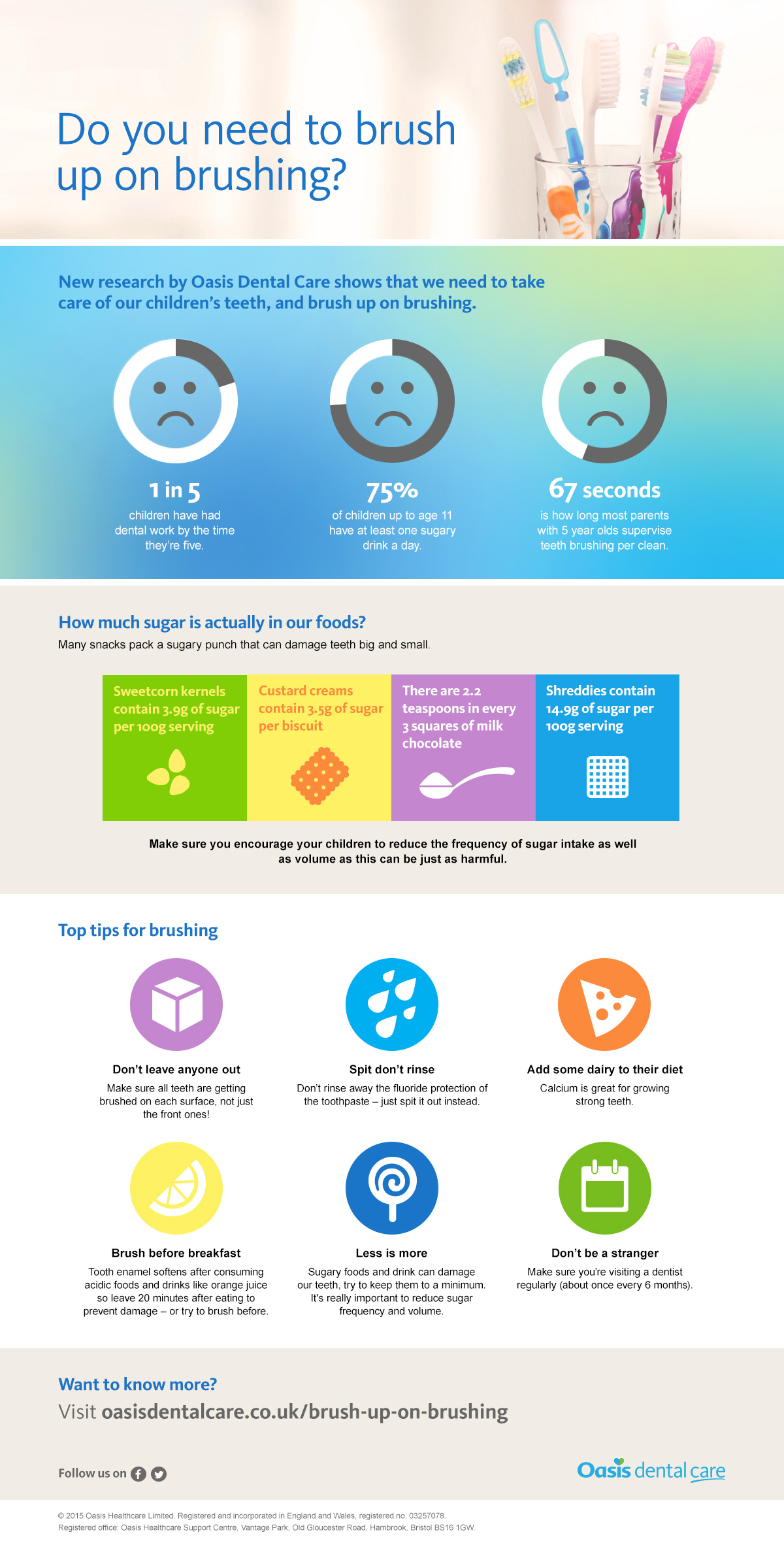-

Parenting on Female First

The survey also revealed that more than a third (37%) have had fillings, a quarter (26%) needed at least one crown, whilst a third (35%) needed gum disease treatment. By the age of nine, the survey found that nearly a third of children (29%) have had one of these treatments.
A fifth of children aged two to five only have their teeth brushed once a day, and over a quarter (26%) regularly go at least one day a week without having their teeth brushed. Only 57% of parents could confidently say that their child never goes a day without cleaning their teeth. Brushing habits appear to get better as children get older with 18% of children aged 8-11 going one day a week without brushing their teeth.
The report also found that the typical parent with a five year old supervises teeth brushing for just 67 seconds per day. Only 7% of parents manage the recommended two minutes twice a day even though 69% of parents knew that children need to brush their teeth for two minutes.
Over a quarter (29%) of UK parents with five year olds find cleaning their children's teeth the most stressful part of the day and dread it, resulting in one in ten (9%) leaving their children to get on with it themselves. For those that supervise they often meet resistance; children either runaway (9%), have a tantrum (8%), make excuses (19%) or get upset (14%).
Ironically, the survey revealed that as they try to deal with teeth cleaning tantrums, more than one in ten parents with five year olds bribe them with sweets. Meanwhile looking at parents of 2 - 11 year olds, 5% thought that it's not necessary to brush milk teeth as they 'will fall out anyway'. 12% of parents didn't think you could have fillings in milk teeth and more than one in five parents wrongly believed that children under the age of five shouldn't use fluoride toothpaste.
Talking about the findings Eddie Coyle, Dentist and Head of Clinical Services for Oasis Dental Care, commented "This research shows that education is really important. Many people are simply unaware of how to take care of their children's dental hygiene. In this campaign we are encouraging parents to 'take two' twice a day to ensure their children are brushing their teeth properly. If parents invest time in their children's dental care early on, they could avoid invasive dental procedures not only in childhood, but also in adult life."
Of those parents whose children have needed dental work, 74% of parents surveyed admitted to feeling guilty or upset when their child needed their first filling. However, only 15% changed their tooth brushing habits and only 6% changed their diet.
Eddie commented "It's only natural to feel guilty when your child needs dental work and one thing we have noticed across our 350 dental practices is that people often simply neglect to brush their teeth properly, getting into bad habits and cutting corners. But, it's not just about how you brush your teeth - diet plays a big part too, and reducing the intake of sugary snacks is really important."
Of those surveyed only 5% of children don't eat a sugary snack every day. Nearly half (46%) of two year olds have 2-3 sugary snacks a day and by the age of five this increases to two thirds (62%) of children. Add to this the daily consumption of sugary drinks and it becomes clear that brushing regularly and properly is very important.
74% of children have at least one sugary drink a day and by the age of three a third of children are having 2-3 sugary drinks daily. By five a third of children are having between 3-4 sugary drinks such as fruit juices, squashes or soft drinks a day.
Eddie added "These findings paint a worrying picture as children as young as two are eating and drinking sugary snacks and drinks regularly every day. We would therefore urge parents to think about the levels of sugar content in foods and drink that they and their children consume as foods high in sugar and carbohydrates increase mouth bacteria which attack the teeth, causing decay. The teeth's natural defence, salvia, takes around an hour following consumption of these high sugar foods, to build up. That's why it's really important to reduce the frequency of sugar consumption as well as the volume."
To view the Brush up on Brushing oral care advice, to download a teeth brushing chart and to find out the sugar content of popular foods check out the Oasis website www.oasisdentalcare.co.uk
Families can also join the conversation online and share best practice using the hashtag #taketwo.

